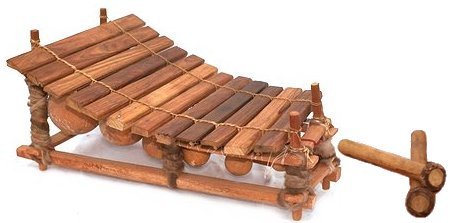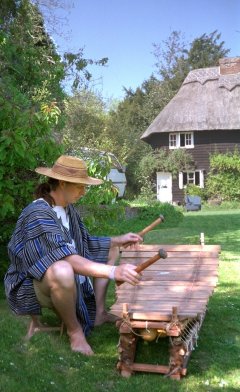
The xylophones or ‘Gyile’ in Dagarti are from the North West of
Ghana. They are also known as ‘Balafon’ and ‘Marimba’.
The xylophonist is also a vocalist, playing on their own or with flute or
drum. xylophones are used at funerals, festivals and celebrations providing
both melody and rhythm.
The pentatonic scale C D E G A is traditionally used although Western tuned
xylophones are also available.
Sizes, prices and ordering
 Use our introductory
audio cassette to learn the techniques, melodies and interwoven rhythms of
West African xylophone music.
Use our introductory
audio cassette to learn the techniques, melodies and interwoven rhythms of
West African xylophone music.
The Producers
The xylophones are made at Ghana’s and probably West Africa’s leading
xylophone workshop – set up by the renowned performer and xylophone
maker Christopher Doozie.
Christopher's knowledge was passed down from his Grandfather in his early
years in the North West of Ghana. In the 1970’s he moved down to Accra
to take the post of xylophonist with The Ghana Dance Ensemble, later to perform
and teach abroad in his own capacity. He is still based in Accra running
his xylophone workshop, teaching and performing on a regular basis. His
instruments are well known across Europe, in the States and throughout
Ghana.
How they are made:
The keys of the xylophone are made from the male Shea Butter tree. The tree
must have been dead for a number of years for it to have lost most of its
natural oils, having mostly died in bush fires. The wood is cut into planks
and dried over fires built into the ground. The planks are cut into keys
with a short handled axe, and a sharp knife is used for fine tuning. Wood
is cut from the middle if the note is flat and from the ends if it is sharp.
Gourds are then cut under the keys amplifying their sound. The beaters are
made from wood and rubber, the rubber is recycled from old truck tyres. The
beaters are held between the fore and middle fingers.